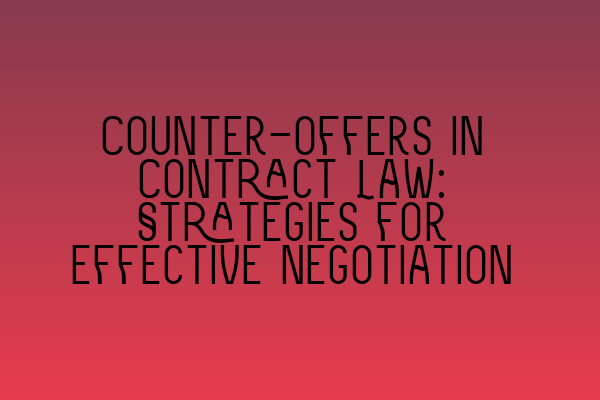Counter-offers in Contract Law: Strategies for Effective Negotiation
Contract law relies heavily on effective negotiation strategies to ensure that both parties reach a mutually agreeable outcome. One important aspect of negotiation is the use of counter-offers. Understanding how to make and respond to counter-offers can significantly impact the outcome of a negotiation. In this article, we will delve into the intricacies of counter-offers in contract law and provide strategies for effective negotiation.
What is a Counter-Offer?
A counter-offer is a response to an initial offer made in a negotiation. When one party receives an offer from the other party, they have the option to accept, reject, or make a counter-offer. A counter-offer effectively rejects the initial offer and proposes new terms for the contract. It acts as a negotiation tool to establish the terms and conditions that both parties find acceptable.
It is crucial to understand that a counter-offer has the legal effect of terminating the initial offer. Once a counter-offer is made, the initial offer is no longer valid. Therefore, it is essential to carefully consider the terms of the counter-offer to avoid unintended consequences.
Strategies for Making a Counter-Offer
When making a counter-offer, it is essential to have a clear understanding of your goals and priorities. Consider the following strategies to make an effective counter-offer:
1. Carefully Assess the Initial Offer
Before making a counter-offer, it is crucial to thoroughly evaluate the initial offer. Determine which terms are acceptable and which require renegotiation. Consider your priorities and objectives, as well as any red flags or potential risks associated with the offer.
Remember to remain objective and consider the value and practicality of the terms being proposed. Take into account industry standards, market conditions, and any relevant regulations or laws that may impact the contract.
2. Clearly Communicate Your Objectives
When making a counter-offer, clearly communicate your objectives to the other party. Explain your reasoning behind the proposed changes and how they align with your priorities. Articulate your desired outcomes and present any supporting evidence or data that justify your counter-offer.
Remember to remain professional and approach the negotiation with a cooperative mindset. The goal is to reach a mutually agreeable outcome, so try to find common ground and potential areas of compromise.
3. Prioritize the Most Important Terms
Not every term in a contract holds equal importance. Prioritize the most essential terms and focus your counter-offer on those aspects. By emphasizing the key elements that matter most to you, you can streamline the negotiation process and increase the likelihood of reaching an agreement.
By setting clear priorities, both you and the other party can better understand each other’s needs and work towards finding a fair compromise.
4. Consider Alternatives
When making a counter-offer, it is beneficial to have alternatives in mind. By presenting alternative options, you provide flexibility and options for the other party to consider. This can lead to more creative and effective negotiation outcomes.
Consider alternative terms, pricing structures, or performance obligations that may address both parties’ interests. By presenting multiple options, you demonstrate your willingness to find a solution that benefits all parties involved.
Strategies for Responding to a Counter-Offer
As with making a counter-offer, responding to a counter-offer requires careful consideration and strategic thinking. Consider the following strategies when responding to a counter-offer:
1. Assess the Counter-Offer Objectively
Take the time to objectively assess the counter-offer. Analyze how it aligns with your own objectives and priorities. Consider the potential benefits and drawbacks of accepting the counter-offer compared to your initial offer.
Be open-minded and consider the other party’s perspective. Remember, negotiation is a give-and-take process, and finding a compromise that satisfies both parties is the ultimate goal.
2. Identify Key Points of Agreement
When responding to a counter-offer, identify the key points of agreement between the initial offer and the counter-offer. By acknowledging areas of agreement, you can build upon those common grounds to formulate a revised offer that addresses any differences.
Highlight the shared objectives and propose solutions that bridge the gap between the initial offer and the counter-offer. This collaborative approach can create a positive atmosphere for negotiation and increase the likelihood of reaching a favorable outcome.
3. Clearly Communicate Your Rationale
When responding to a counter-offer, clearly communicate your rationale behind accepting or rejecting specific terms. Explain how the counter-offer aligns with your objectives and any changes or concessions you are willing to make.
Be transparent and provide supporting evidence or data that substantiate your position. Clarity and effective communication can help foster trust and understanding between the parties involved.
4. Assess the Potential Consequences
Before finalizing your response to a counter-offer, assess the potential consequences of accepting or rejecting the counter-offer. Consider the long-term implications and any potential risks associated with the proposed terms.
If necessary, consult with legal counsel to ensure you fully understand the legal and financial implications of accepting or rejecting the counter-offer. Their expertise can provide valuable insights into the best course of action.
Conclusion
Counter-offers play a vital role in contract law negotiations. Understanding how to effectively make and respond to counter-offers can lead to more favorable outcomes and mutually agreeable contracts.
Remember to carefully assess the initial offer, clearly communicate your objectives, prioritize essential terms, and consider alternatives when making a counter-offer. When responding to a counter-offer, assess it objectively, identify key points of agreement, communicate your rationale, and assess the potential consequences.
By employing these strategies, you can navigate the negotiation process with confidence and increase your chances of reaching a successful resolution.
Related Articles:
